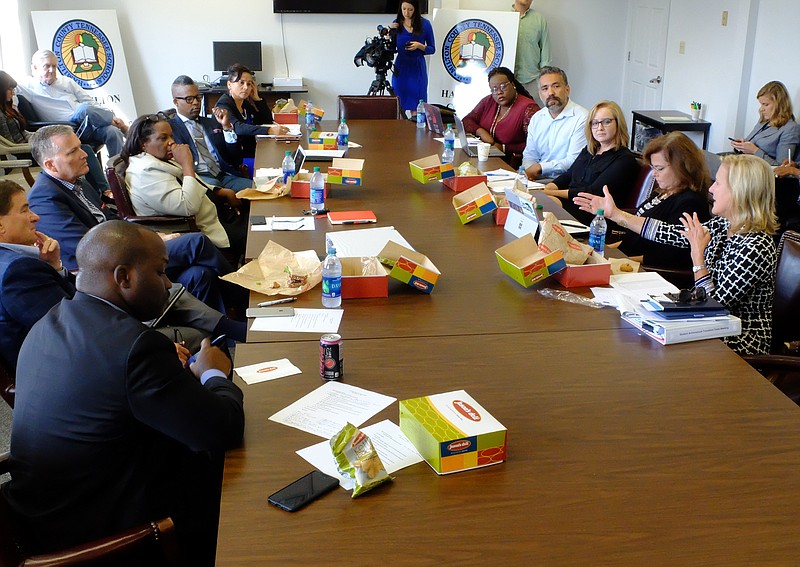In the school system's latest effort to prepare students for post-secondary options, the Hamilton County Department of Education has unveiled a preliminary plan for new "Future Ready Institutes."
The Future Ready Institutes are intended to be isolated, small learning communities, one in each county high school, formed around an industry theme, career and technical (or CTE) courses and traditional high school curriculum.
The institutes come out of a partnership among the district, Chattanooga 2.0, the Chattanooga Area Chamber of Commerce, Chattanooga State Community College and the Tennessee College of Applied Technology.
The district intends to establish an industry partner for each institute, specific to that institute's theme, whether it be business, health sciences, advanced manufacturing or other STEM-related industries.
Though many similar opportunities are offered at most Hamilton County high schools through career and technical courses, Superintendent Bryan Johnson said this is also an attempt to streamline focus and resources across the district.
"All of our high schools already have career and technical education courses," Johnson said. "What you find a lot of time is you're trying to do a little bit in a whole lot of areas instead of trying to streamline your approach and these are really centered around two things: what interests students and what jobs are going to be, what the workforce will look like."
The district has worked in recent years to expand post-secondary preparation for students after hearing local business leaders' concerns that they were not able to recruit a skilled workforce from the local population.
Data in 2015 showed that 65 percent of Hamilton County Schools graduates failed to earn any education past high school, which led the district to launch the Mechatronics and Polytechnic Academies. Those allow high school students to start earning industry credentials along with their high school diplomas.
The success of this program led to the launch of Polytechnic Academy on Chattanooga State's campus, open to 100 high school juniors.
The district hopes the Future Ready Institutes will be the next step in this evolution.
"Our goal as a district is to have our students graduate post-secondary ready, and if we aren't getting them there then we are missing the mark," Johnson said. "We don't educate our students in isolation; we need to educate students with an eye focused on where will they be when they graduate."
Each institute is projected to enroll 100 ninth-grade students in the next school year, adding an additional 100 students each year afterward, with about 400 students through all grades at any time.
The curriculum will take a project-based learning approach and have a definitive course sequence, explained Blake Freeman, the director of the Future Ready Institutes, at a school board meeting.
The initiative expects to levy business partners to provide relevant guest speakers, mentorship opportunities, internships and professional development opportunities for teachers.
"The most important opportunity I see is that business and industries can have authentic partnerships that truly bolster their talent pipelines versus benevolent sponsorships where we just ask money of organizations," said Jared Bigham, executive director of Chattanooga 2.0, one of the program's partners.
The district also plans to open enrollment to those academies across the district, leaving logistical questions of zoning and transportation unanswered.
District 1 school board member Rhonda Thurman is concerned that logistics and funding will overshadow the program's goals.
"We can't afford to put all these things in all these different schools," she said. "We already spend $14 million on transportation. This will blow our budget wide open."
Instead of busing students to different institutes, Thurman said, she'd "rather have one school where all these things were, rather than putting little pods in each school doing different things."
However, issues of transportation and logistics are not the main focus for the program's organizers quite yet.
"This is still in the early stages," Johnson said. "It's a work in progress, but our commitment is to give the students the opportunities and exposures to what ultimately awaits them."
The next steps include establishing specific business partners and themes for each institute, holding information nights for parents of rising high school freshmen to explore their options, professional development for teachers and a public kickoff event - all set to occur early next year.
As for the cost, the district seems to be planning for the institutes to align with current career and technical education funding allocations.
"It will make us focus CTE funding and programming to make sure we are giving opportunities to students all over the district," District 6 school board member Joe Galloway said in a board meeting. "I see us as being more focused."
The possible effect on current CTE teachers is unknown, though staff might be reassigned or more staff might need to be added based on the needs and experience level required for particular institutes.
Though the school board does not have to approve the initiative, any funding changes or allocations for the Future Ready Institutes must be voted on and approved by the board.
Contact Meghan Mangrum at mmangrum@timesfreepress.com or 423-757-6592. Follow her on Twitter @memangrum.
